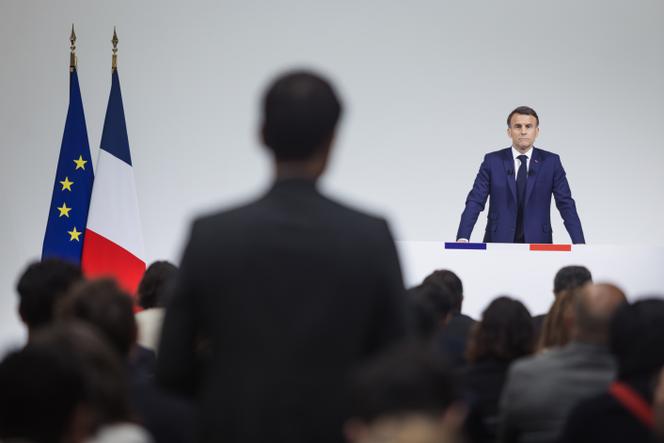


Standing behind a lectern in a chic salon on Paris's Rue Cambon, a stone's throw from the Elysée – so as not to be suspected of using state resources – President Emmanuel Macron, for once, kept a low profile on Wednesday, June 12. Having called the press conference to justify "with gravity" his decision to dissolve the Assemblée Nationale three days earlier, he spoke of a "parliamentary equation that is difficult to sustain"; the "anger" and "resentment" expressed by the French on June 9, to which "we cannot remain indifferent or deaf"; and, finally, the threat of a motion of no confidence from the opposition this fall, when Parliament is to decide on next year's budget. Macron said that these three criteria "forced" a "return to the sovereign people," calling it "the only republican response."
In front of an audience of some 200 journalists and a carefully listening government, he asserted that the dissolution was not the result of an outburst of anger or pride, as his critics suspect, but of a rational decision. It would even, he boasted, provide "clarification."
Macron has heard the wish of his coalition and allies that he should take a back seat for the June 30 and July 7 elections, due to the backlash he personally faces. "I won't be campaigning in the legislative elections, just as I didn't in 2017 and 2022," he pledged. It is Prime Minister Gabriel Attal, seated in the front row and showing little expression, "who will carry this campaign," promised the French president. Former prime minister Edouard Philippe, who unlike most Macron allies was absent from the press conference, said on Tuesday that the president's involvement in the elections was "not completely healthy." In return, Macron mocked the "personal ambitions" of certain figures he didn't name, saying they were "hindered" by the dissolution.
On Wednesday, the French president, whose troops are now caught between "two blocs," a far-right one and a left-wing one, launched a "battle of values" against the "extremes." Whereas until June 9, he had targeted only the far-right Rassemblement National (RN), he is now focusing on the radical left La France Insoumise (LFI) with the same intensity. He accused Jean-Luc Mélenchon's party of "anti-Semitism," "anti-parliamentarianism" and of having "created a sometimes constant disorder" in the Assemblée Nationale. He called the "popular front" alliance being formed between the Socialists, the Communists, the Greens and LFI "indecent."
Macron said he has "had a thought, over the last 24 hours, for Léon Blum [the head of the Popular Front left-wing government in 1936], who must have turned in his grave."
You have 59.07% of this article left to read. The rest is for subscribers only.
